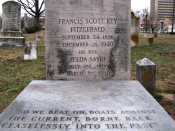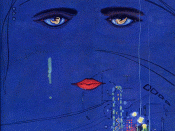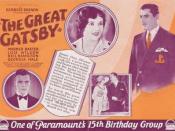"Our great cities and our mighty buildings will avail us not if we lack spiritual strength to subdue mere objects to the higher purposes of humanity" (Harnsberger 14), is what Lyndon B. Johnson had to say about materialism. He knew the value of money, and he realized the power and effect of money. Money can have many effects, however money cannot buy happiness. Many people disbelieve this fact, and many continue to try and actually buy articles that make them happy. In F. Scott Fitzgerald's The Great Gatsby, Fizgerald keenly shows us how Jay Gatsby is one of these people. Gatsby believes that if he has money, he can do attain great goals. Gatsby is a sensible man, yet he has many false conceptions. Jay Gatsby believes that money can recreate the past, can buy him happiness, and can be helpful in achieving a level of prestige in the prominent East Egg.
Jay Gatsby believes he can buy happiness; and this is exhibited through his house, his clothes, and through Daisy. He owns a large portion of finances due to some mysterious source of wealth, and he uses this mystery source to buy his house, his clothes, and Daisy. Gatsby's house, as Fitzgerald describes it, is "a factual imitation of some Hotel de Ville in Normandy, with a tower on one side, spanking new under a thin beard of raw ivy, and a marble swimming pool and more than forty acres of lawn and garden" (Fitzgerald 9). This house, as Fitzgerald fabulously enlightens to, is an immaculate symbol of Gatsby's incalculable income. "The house he feels he needs in order to win happiness" (Bewley 24), is an elegant mansion; that of which an excellent symbol of carelessness is displayed and is part of Gatsby's own persona. Every Monday after a...



Helpful
It's helpful for me to write about Gatsby's basing his dream on materialism, which is a main factor that ruins Gatsby's dream.
0 out of 0 people found this comment useful.